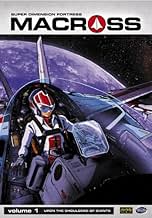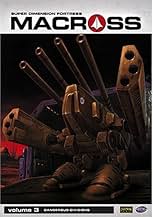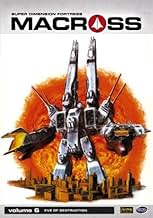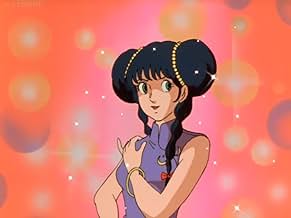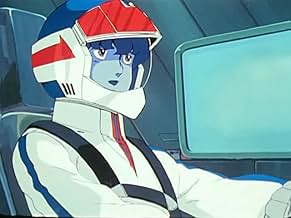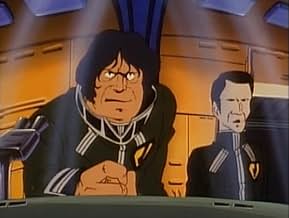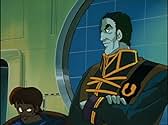Super Dimension Fortress Macross
Originaltitel: Choujikuu Yousai Macross
IMDb-BEWERTUNG
8,5/10
2390
IHRE BEWERTUNG
Füge eine Handlung in deiner Sprache hinzuAn alien spaceship crash lands on Earth and her secrets lead to a desperate war against an alien enemy sent to retrieve the ship.An alien spaceship crash lands on Earth and her secrets lead to a desperate war against an alien enemy sent to retrieve the ship.An alien spaceship crash lands on Earth and her secrets lead to a desperate war against an alien enemy sent to retrieve the ship.
Folgen durchsuchen
Handlung
WUSSTEST DU SCHON:
- WissenswertesThe codename for the Macross bridge is Gunsight One. Gunsight One was a Gundam fan club founded by some of the staff members (such as creator Shoji Kawamori and character designer Haruhiko Mikimoto), mecha and anime fanatics on their own right.
- PatzerDue to the fact that at least three studios of wildly varying quality worked on each episode simultaneously, many minor continuity errors and animation inconsistencies (for instance in Ep. 3 "Spacefold" where the escape pod under Roy's Valk every so often switches to a gunpod) crop up in each episode.
- Zitate
Max Jenius: Wonderful. Bust, 83 cm. Will expand when unwrapped.
- Crazy CreditsThe original showing of the pilot episode had a different beginning, not revealing the transforming capabilities of the Valkyries in order to give the audience a suprise. The opening was changed to the regular one for all further showings.
- Alternative VersionenThe first two episodes were originally edited in to one hour-long episode for the show's premiere on 5 October 1982 in the Osaka region. The opening of the show was changed to avoid any shots of Hikaru in a Valkyrie or the Valkyrie's "Battroid" (full robot) mode.
- VerbindungenEdited into Robotech (1985)
- SoundtracksMy Boyfriend is a Pilot
Performed by Mari Iijima
Ausgewählte Rezension
Macross... The original.
Originally intended to be just a parody of Gundam, it evolved into becoming an entity of its own, with a compelling storyline and a deeply anti-war message.
Genre-defining character designs by Haruhiko Mikimoto, excellent space craft and mecha designs by Shoji Kawamori and Kazutaka Miyatake and great directing work by Noboru Ishiguro were the first part of Macross' enormous success. Shoji Kawamori's VF-1 Valkyrie is one of the most easily identified anime mecha ever and for good reason: I've yet to see one that can match its sleek, yet strong and purposeful lines. It looks like it's ready to take off and go on a war, whereas other mecha often look like gimmicks.
The characters seemed to actually live and breathe, developing their personalities through the ordeal of their perversely unequal war against the Zentradi, the loss of friends, loved ones, the senseless suffering and carnage that war is, their change of heart over time...
And all this enhanced by the very fine voice acting of Arihiro Hase, Mari Iijima, Mika Doi, Akira Kamiya, Michio Hazama, Noriko Ohara and other distinguished Japanese voice actors and actresses, who conveyed the dialogue in a manner forceful, economical, emotionally wealthy and mature.
Add to this Mari Iijima's excellent voice and performance on each and every one of Lynn Minmay's songs - even the songs seem to evolve as Minmay grows: from the childish and girlie-love pop of "Zero-G Love" and "Watashi No Kare Wa Pairotto" ("My Boyfriend Is A Pilot") to the beautiful, softly-sung and emotionally overwhelming anti-war "Ai Wa Nagareru" ("Love Drifts Away"), which was performed during the Macross' battle against Gorg Bodolzaa's armada, the equally powerful elegy "My Beautiful Place" or the series' last song, "Yasashisa Sayonara" (Farewell Tenderness"). And the rest of Macross' soundtrack is a wonderful merger of a symphonic orchestra with rock, jazz and even blues influences.
Macross is a sad story; it is not quite an epic, although it features battle after battle. It's an anti-war story - it brings forth a message to everyone, a message stating that the works of peace and culture are immensely superior to the cruel barbarity of war.
Sadly, in the haste to produce the episodes fast enough, a number of episodes was farmed out to a Korean studio named Anime Friend, whose work was sub-par and introduced a fair number of animation errors. Despite this, Macross still is a shining gem and deservedly enjoys a strong following in Japan and internationally, even now, 20 years on.
Unfortunately for the Western world, in 1985, an American company named Harmony Gold and someone named Carl Macek combined Macross with two other anime series (Super Dimension Cavalry Southern Cross and Genesis Pit Climber M.O.S.P.E.A.D.A.), dumbing down the dialogues, to which they added even more (to the point where you wondered if the characters ever stop talking), replacing the meticulous use of silence with excessive narration with someone who sounds like a sportscaster on steroids, the cohesive storyline with a mangled patchwork, the artful voice acting with over-the-top "performances" by third-rate "actors", the lovely soundtrack with generic synth stuff, Mari Iijima's wonderful songs with outrageous "creations" "performed" by the Reba West (Rebecca Forstadt), who is more annoying than a car alarm. The worst display of Harmony Gold's inability to comprehend ANYTHING that Macross stands for is the replacement of "Ai Wa Nagareru" with the jingoistic attempt at anthem-writing titled "We Will Win".
Originally intended to be just a parody of Gundam, it evolved into becoming an entity of its own, with a compelling storyline and a deeply anti-war message.
Genre-defining character designs by Haruhiko Mikimoto, excellent space craft and mecha designs by Shoji Kawamori and Kazutaka Miyatake and great directing work by Noboru Ishiguro were the first part of Macross' enormous success. Shoji Kawamori's VF-1 Valkyrie is one of the most easily identified anime mecha ever and for good reason: I've yet to see one that can match its sleek, yet strong and purposeful lines. It looks like it's ready to take off and go on a war, whereas other mecha often look like gimmicks.
The characters seemed to actually live and breathe, developing their personalities through the ordeal of their perversely unequal war against the Zentradi, the loss of friends, loved ones, the senseless suffering and carnage that war is, their change of heart over time...
And all this enhanced by the very fine voice acting of Arihiro Hase, Mari Iijima, Mika Doi, Akira Kamiya, Michio Hazama, Noriko Ohara and other distinguished Japanese voice actors and actresses, who conveyed the dialogue in a manner forceful, economical, emotionally wealthy and mature.
Add to this Mari Iijima's excellent voice and performance on each and every one of Lynn Minmay's songs - even the songs seem to evolve as Minmay grows: from the childish and girlie-love pop of "Zero-G Love" and "Watashi No Kare Wa Pairotto" ("My Boyfriend Is A Pilot") to the beautiful, softly-sung and emotionally overwhelming anti-war "Ai Wa Nagareru" ("Love Drifts Away"), which was performed during the Macross' battle against Gorg Bodolzaa's armada, the equally powerful elegy "My Beautiful Place" or the series' last song, "Yasashisa Sayonara" (Farewell Tenderness"). And the rest of Macross' soundtrack is a wonderful merger of a symphonic orchestra with rock, jazz and even blues influences.
Macross is a sad story; it is not quite an epic, although it features battle after battle. It's an anti-war story - it brings forth a message to everyone, a message stating that the works of peace and culture are immensely superior to the cruel barbarity of war.
Sadly, in the haste to produce the episodes fast enough, a number of episodes was farmed out to a Korean studio named Anime Friend, whose work was sub-par and introduced a fair number of animation errors. Despite this, Macross still is a shining gem and deservedly enjoys a strong following in Japan and internationally, even now, 20 years on.
Unfortunately for the Western world, in 1985, an American company named Harmony Gold and someone named Carl Macek combined Macross with two other anime series (Super Dimension Cavalry Southern Cross and Genesis Pit Climber M.O.S.P.E.A.D.A.), dumbing down the dialogues, to which they added even more (to the point where you wondered if the characters ever stop talking), replacing the meticulous use of silence with excessive narration with someone who sounds like a sportscaster on steroids, the cohesive storyline with a mangled patchwork, the artful voice acting with over-the-top "performances" by third-rate "actors", the lovely soundtrack with generic synth stuff, Mari Iijima's wonderful songs with outrageous "creations" "performed" by the Reba West (Rebecca Forstadt), who is more annoying than a car alarm. The worst display of Harmony Gold's inability to comprehend ANYTHING that Macross stands for is the replacement of "Ai Wa Nagareru" with the jingoistic attempt at anthem-writing titled "We Will Win".
Top-Auswahl
Melde dich zum Bewerten an und greife auf die Watchlist für personalisierte Empfehlungen zu.
- How many seasons does Super Dimension Fortress Macross have?Powered by Alexa
Details
Zu dieser Seite beitragen
Bearbeitung vorschlagen oder fehlenden Inhalt hinzufügen

Oberste Lücke
By what name was Super Dimension Fortress Macross (1982) officially released in Canada in English?
Antwort


